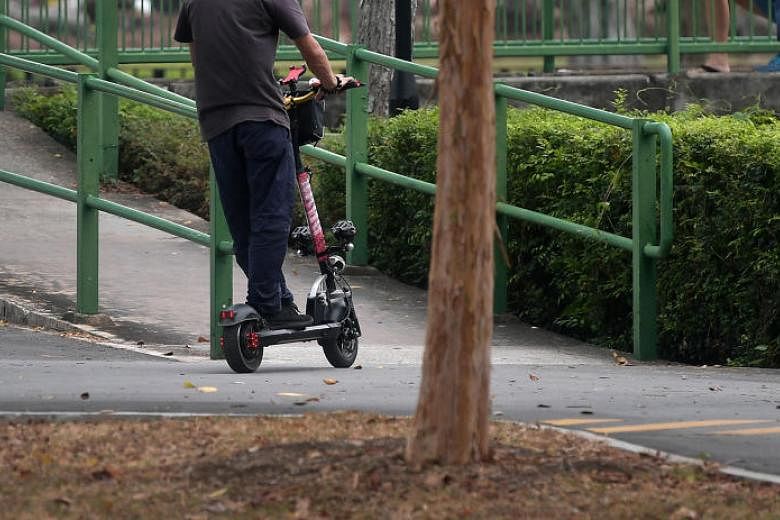SINGAPORE - Mandatory theory tests for e-scooter and electric bicycle riders will begin from the middle of this year, Senior Parliamentary Secretary for Transport Baey Yam Keng said on Friday (March 5).
This will ensure all riders of such motorised devices know the prevailing rules and codes of conduct, he said during the debate on his ministry's budget.
In another move to improve safety, Mr Baey said all bicycles used on public paths and roads will also be required to have at least one functioning handbrake, with effect from September.
While he did not give a firm date on when mandatory testing for e-scooter and e-bike riders would start, he said a test handbook will be released next month.
The announcement comes more than a year after the idea for a mandatory test was first mooted by the Active Mobility Advisory Panel (AMAP) in September 2019, following a spate of accidents involving mobility devices and the death of a cyclist after a collision with a speeding, non-compliant e-scooter.
The AMP had also proposed the requirement for all bicycles to have at least one working handbrake, which the Government accepted in January. It was prompted by a fatal accident involving a brakeless bicycle last year.
Highlighting other efforts to improve safety on public paths, such as mandatory third-party liability insurance for those who use active mobility devices for work, Mr Baey said the authorities will also step up education efforts.
A new campaign will be launched in May to raise awareness on how paths can be shared in a safe and gracious manner.
There are also plans to refresh the Safe Riding Programme, which was started in 2018, in the second quarter of this year to make it more interactive.
Mr Lim Biow Chuan (Mountbatten) asked for more to be done to ensure the safety of pedestrians using the footpaths and park connectors.
While banning e-scooters from footpaths has brought some relief, the growing number of cyclists has led to regular complaints of irresponsible behaviour, he said, urging the authorities to step up enforcement and install more cameras.
In response, Mr Baey noted that accidents involving motorised personal mobility devivces (PMDs) on footpaths fell by almost 80 per cent between 2019 and last year. There were 30 such accidents in 2020, compared with 144 the year before.
"What is most important is that we continue working with the community to reduce accidents," he said. "In a small, land-constrained city like Singapore, active mobility infrastructure and regulations can only go so far. All of us have a critical role to play too."
Senior Minister of State for Transport Amy Khor said a new import controls regime for PMDs and e-bikes will be rolled out in the first half of the year to further enhance safety.
This will help prevent the import of non-compliant mobility devices, she said.
Under current regulations, PMDs ridden in public must meet the UL2272 fire safety standard, cannot exceed 20kg in weight and 70cm in width, and can have a top speed of 25kmh only. Dr Khor said the authorities will continue to inspect mobility devices regularly to deter illegal modifications.
She added: "Since the start of the Covid-19 pandemic, many Singaporeans have embraced cycling and walking... We are harnessing this momentum to enhance the safety and ease of using (walk, cycle and ride) modes."


